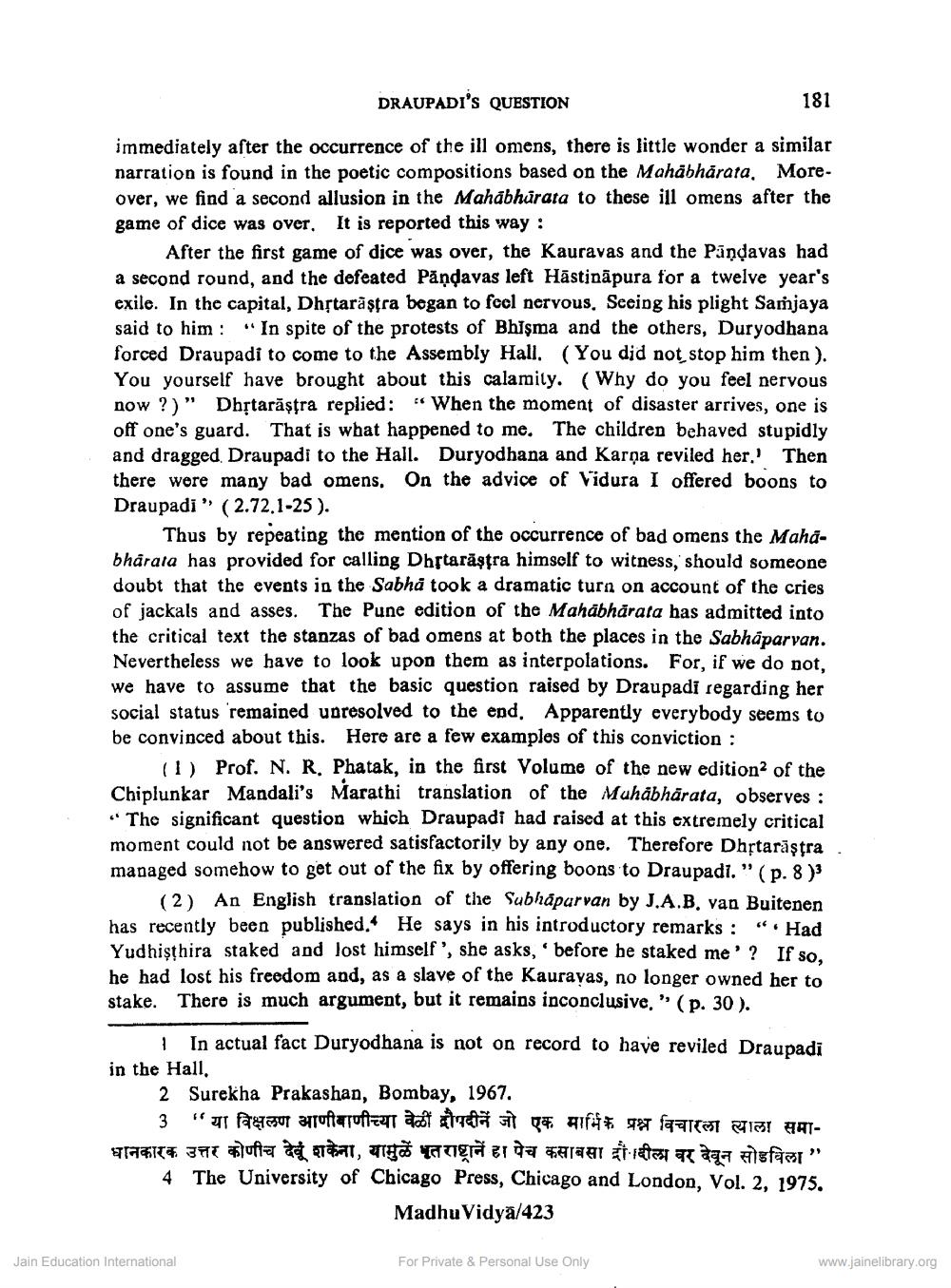________________
DRAUPADI'S QUESTION
181
immediately after the occurrence of the ill omens, there is little wonder a similar narration is found in the poetic compositions based on the Mahabharata, Moreover, we find a second allusion in the Mahabharata to these ill omens after the game of dice was over. It is reported this way:
After the first game of dice was over, the Kauravas and the Pandavas had a second round, and the defeated Pandavas left Hastinapura for a twelve year's exile. In the capital, Dhṛtarăştra began to feel nervous. Seeing his plight Samjaya said to him: "In spite of the protests of Bhisma and the others, Duryodhana forced Draupadi to come to the Assembly Hall. (You did not stop him then). You yourself have brought about this calamity. (Why do you feel nervous now ?)" Dhṛtarăştra replied: "When the moment of disaster arrives, one is off one's guard. That is what happened to me. The children behaved stupidly and dragged, Draupadi to the Hall. Duryodhana and Karça reviled her.' Then there were many bad omens. On the advice of Vidura I offered boons to Draupadi" (2.72.1-25).
Thus by repeating the mention of the occurrence of bad omens the Mahdbharata has provided for calling Dhrtarăştra himself to witness, should someone doubt that the events in the Sabhā took a dramatic turn on account of the cries of jackals and asses. The Pune edition of the Mahabharata has admitted into the critical text the stanzas of bad omens at both the places in the Sabhaparvan. Nevertheless we have to look upon them as interpolations. For, if we do not, we have to assume that the basic question raised by Draupadi regarding her social status remained unresolved to the end, Apparently everybody seems to be convinced about this. Here are a few examples of this conviction:
(1) Prof. N. R. Phatak, in the first Volume of the new edition2 of the Chiplunkar Mandali's Marathi translation of the Mahabharata, observes: The significant question which Draupadi had raised at this extremely critical moment could not be answered satisfactorily by any one. Therefore Dhṛtarăştra managed somehow to get out of the fix by offering boons to Draupadi. " (p. 8)
(2) An English translation of the Subhapurvan by J.A.B. van Buitenen has recently been published. He says in his introductory remarks: Yudhisthira staked and lost himself', she asks, before he staked me? If so, he had lost his freedom and, as a slave of the Kauravas, no longer owned her to stake. There is much argument, but it remains inconclusive," (p. 30).
In actual fact Duryodhana is not on record to have reviled Draupadi
in the Hall,
2 Surekha Prakashan, Bombay, 1967.
3 " या विक्षलण आणीबाणीच्या वेळीं द्रौपदीनें जो एक मार्मिक प्रश्न विचारला त्याला समाधानकारक उत्तर कोणीच देवू शकेना, यामुळे धृतराष्ट्रानें हा पेच कसाबसा दी। बीला पर देवून सोडविला " 4 The University of Chicago Press, Chicago and London, Vol. 2, 1975. MadhuVidya/423
Jain Education International
For Private & Personal Use Only
www.jainelibrary.org




